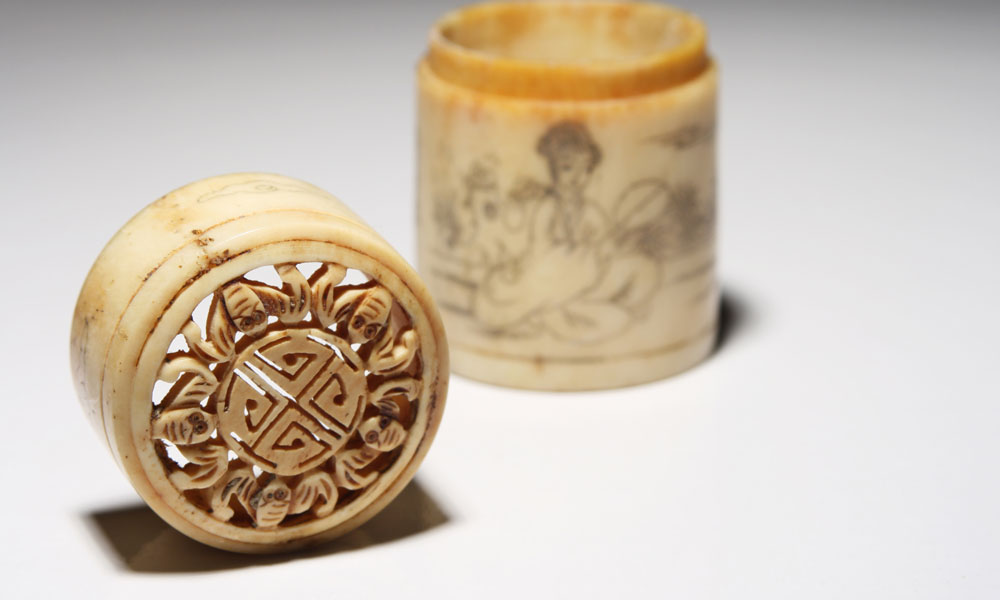
Antique Groups Feel Pressure of Anti-Ivory Rules
As states and the Obama administration crack down on the sale of ivory, antique groups are challenging legislation in order to ensure the exemption of legally obtained ivory goods.
The black market for ivory continues to diminish elephant populations across the African region and has even been linked to funding terrorism.
With 40,000 elephants killed for ivory in 2011 alone, the president has called the plight an “international crisis.” But does possessing ivory antiques mean compliance to wildlife decimation? Many activists would say yes. And that position, some antique enthusiasts fear, will target them unfairly.
The debate has been revitalized by the Obama administration’s aggressive plan to curb illegal wildlife trafficking, an estimated $20-billion-a-year market. Several states have already instituted bans or are in the process of cracking down on ivory sales, including Vermont. While few would object to protecting endangered species, the situation becomes complicated by the lawful possession of ivory antiques—some of which have been in families for generations.
“People are having trouble connecting their grandmother’s piano with terrorism,” Vermont Rep. David Deen (D), chairman of the state’s House Committee on Fish, Wildlife and Water Resources, told The Associated Press.
The Endangered Species Act features exemptions for commercial trade of antiques that meet certain criteria, which the U.S. Fish and Wildlife Service (USFWS) pledges to uphold. However, the federal agency also believes that prohibiting the commercial use of antiques and other old ivory will ultimately benefit present-day elephant populations in Africa. (In 2013, for example, the agency destroyed six tons of ivory in an effort to draw attention to the issue.)
“It is extremely difficult to differentiate legally acquired ivory, such as ivory imported in the 1970s, from ivory derived from elephant poaching,” reads a statement on the USFWS website. “Our criminal investigations and anti-smuggling efforts have shown clearly that legal ivory trade can serve as a cover for illegal trade. By significantly restricting ivory trade in the United States, it will be more difficult to launder illegal ivory into the market and thus reduce the threat of poaching to imperiled elephant populations.”
However, some antique collectors and dealers view the rollout of anti-ivory legislation as unnecessary encroachment on a long-established tradition.
“The idea … of limiting possession and sale of what was once a legal and accepted commodity and destroying and/or banning the sale of antique items seems like our government overstepping its bounds,” Greg Hamilton, president of the Vermont Antiques Dealers Association, wrote in an email to lawmakers.
The issue has also proved controversial among groups representing musicians, who fought a travel ban on ivory last year. (Many popular vintage instruments, including early Martin guitars, include ivory parts.)
Reaching a Compromise
In the dispute between championing wildlife conservation versus the possession of lawful, though controversial, goods, two congressmen are aiming to reach a middle ground with their own proposed legislation.
The African Elephant Conservation and Legal Ivory Possession Act of 2015 would allow lawfully possessed ivory to be imported and exported for museum displays and personal use and would establish measures for wildlife conservation in conjunction with the Secretary of the Interior and the Secretary of State.
Congressman Don Young (R-AK) says that the bipartisan legislation will protect legal ivory owners, who have lost “countless family heirlooms,” such as musical instruments, firearms, and jewelry, due to restrictions on ivory.
That gives antique enthusiasts reason to celebrate, but equally important is the bill’s emphasis on wildlife conservation.
“This legislation will help crack down on illegal poaching through proper use of the U.S. Fish and Wildlife’s authority across borders, while maintaining protections for legally harvested ivory,” Rep. Collin Peterson (D-MN) said in a news release. “This is a multi-pronged approach, rather than an all-out ban, which is necessary to conserving African Elephants and ensuring that countless legally obtained antiquities can be preserved.”
(iStock/Thinkstock)






Comments